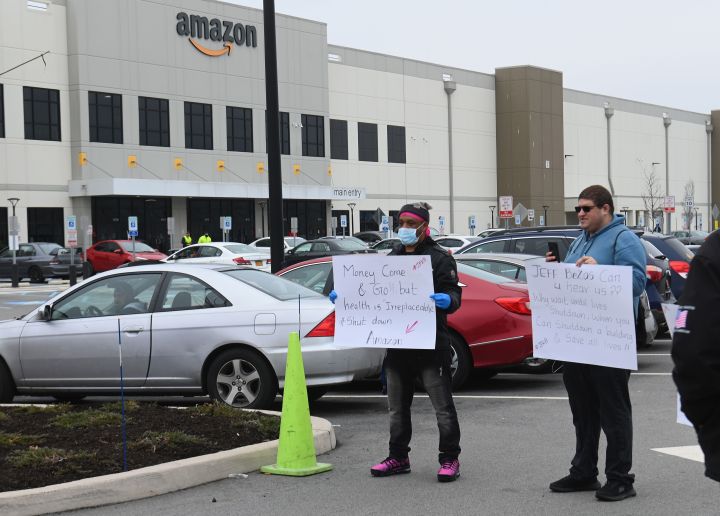
Hazard pay ends soon at Amazon and other major companies

This story was updated May 18 at 8:34 p.m. Eastern time.
While some essential workers have been receiving additional pay during the pandemic, that extra money is going away for employees at major retailers and grocery stores.
The termination of hazard pay comes as many states begin to reopen, including Florida, Wisconsin and Nevada. Although new COVID-19 cases are going down in about half of U.S. states, the risk of contracting the virus remains.
“If an employer was paying hazard pay and stopped providing it, there’s very little an employee could do,” Heidi Shierholz, a senior economist at the Economic Policy Institute, recently told Marketplace’s Kristin Schwab.
The Fair Labor Standards Act doesn’t address hazard pay, only requiring that it’s included as part of a federal employee’s regular rate of pay when computing the employee’s overtime pay, according to the Labor Department.
Kate Bronfenbrenner, the director of labor education research at Cornell University, explained that hazard pay is usually a benefit that unions negotiate through collective bargaining.
In an interview with Recode last Wednesday, Amazon Senior Vice President Dave Clark said the company will extend hazard pay for warehouse workers through the end of May — but resume paying normal rates in June. In mid-March, the retail giant began paying warehouse and delivery workers an extra $2 an hour, along with double overtime pay.
Amazon’s minimum wage is $15 an hour for all full-time, part-time, temporary and seasonal employees across the U.S., according to the company’s website.
The grocery chain Kroger had also been offering a $2-an-hour “hero bonus” to tens of thousands of essential workers but had planned to discontinue that pay yesterday. The United Food and Commercial Workers International Union protested the decision, telling CBS MoneyWatch that “it’s clear the danger isn’t gone even as states reopen—neither should hero pay.”
According to the company, Kroger workers earn $15 an hour, or more than $20 if benefits like health care are factored in.
After receiving criticism for its decision to end hero bonuses, Kroger is now granting workers one-time “thank you pay” of $400 for qualified full-time associates and $200 for qualified part-time associates.
“Kroger seems to have heard us, but it is not good enough. Kroger’s decision today shows that we can have an impact, and that it is important for workers, communities and unions to protest against decisions that harm workers,” the United Food and Commercial Workers Local 21 said in a statement.
Employees at the grocery chain Fred Meyer, whose parent company is Kroger, will also receive the one-time thank you pay in place of a $2 hourly bonus. Companies that had planned to end their additional pay soon, but later reversed their decision, include Target, which extended its $2-an-hour increase to July 4 — two months longer than it originally planned.
There’s a lot happening in the world. Through it all, Marketplace is here for you.
You rely on Marketplace to break down the world’s events and tell you how it affects you in a fact-based, approachable way. We rely on your financial support to keep making that possible.
Your donation today powers the independent journalism that you rely on. For just $5/month, you can help sustain Marketplace so we can keep reporting on the things that matter to you.


















